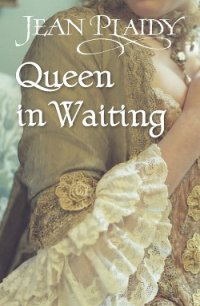The Prince and the Quakeress - Plaidy Jean (книги полностью бесплатно TXT) 📗
One pert young woman, and this in the presence of Lord Chesterfield, murmured that she had heard rumours and had dared suggest that she had had twins. Elizabeth had turned to Chesterfield and demanded to know if he could believe such a thing.
Chesterfield who prided himself on being a wit replied: ‘I never believe more than half I hear. Miss Chudleigh.’ Which remark was noted down and reported and repeated throughout the Court as an illustration of the wit of the Earl of Chesterfield and the scandalous behaviour of Miss Chudleigh.
But she cared nothing for gossip and scandal. Let them chatter to their hearts’ content. She was safe. No one knew she was married to Hervey—nor would they ever be sure of it, because even if he declared they were married she could deny it, for she had taken the precaution of forcing the parson to give her access to the register and had destroyed the certificate of marriage and torn the page from the register on which Mr. Annis, who had married them, had recorded the event.
Now the position had changed. The Earl of Bristol was very ill and Augustus was next in the line of succession to the Earldom. The Countess of Bristol was a very worthy title and she was wishing now that she had not destroyed the evidence of the marriage.
There was nothing to be done, she decided, but to go to Larnston and stay with her aunt and uncle, and when there she would bully little Mr. Annis into giving her another marriage certificate and rewriting the page in the register. It was a very simple matter.
So Miss Chudleigh had left Court ‘to take a little country air,’ and in due course arrived at Winchester and from thence went to the home of her uncle and aunt in Larnston.
They were delighted to see their flamboyant relative from Court who was so beautiful, so dazzling, that everyone for miles round would envy them.
Miss Chudleigh accepted their homage and was graciously charming, explained that she wished to see Mr. Annis without delay for she had important business to discuss with him.
Oh dear, this was a sorry business. Mr. Annis was dangerously ill.
‘All the more reason why I should see him without delay.’
‘But the poor man is on his death-bed.’
‘Then I certainly must see him before he expires.’
‘In fact, his doctor has said he is to see no one.’
Miss Chudleigh smiled. She was not no one. Aunt and Uncle Merrill, country-folk though they were, should know that.
So into the death chamber strode Elizabeth, vital, determined, in great contrast to the lid man on the bed. She must speak with him alone; everyone must leave her; it was of the utmost importance to the saving of his soul.
‘Mr. Annis, can you hear me Mr. Annis?’ His eyes were glassy, but he must live until he had done his task. ‘Mr. Annis, it was a wicked thing you did to destroy that page from the church register. How can you face your Maker, Mr. Annis. with such a sin on your conscience? I have come to save you. You must put back that page before you die.’
Mr. Annis remembered her. Who would ever forget her?
Often he remembered what he had allowed her to do. It was an offence, was it not, a criminal offence to destroy part of the church register.
‘I heard how ill you were and I could not allow you to go before your Maker until you had put this matter right. Do you hear me, Mr. Annis?’
He did hear. He did remember his sin.
‘Now you must give me the keys which open the cupboard or wherever it is the books and certificates are kept. You married me to the Honourable Augustus John Hervey, did you not? Then you must write me another certificate and you must put that page back in the register...somehow. It is the only way to salvation, Mr. Annis.’
Poor Mr. Annis! The sheer will to save his soul kept him alive. In the death-chamber he listened to Elizabeth; he gave her the keys and it was she who guided his hand.
And when he had done as she asked, he lay back on his pillows and died.
An example she told herself of what can be achieved if one only has the will to do it.
Poor old Annis! Let him rest in peace He had done duty; and now if the old Earl of Bristol died tomorrow no one could deny that Elizabeth Chudleigh was the Countess.
• • •
The Earl stubbornly and most unaccommodatingly clung to life and Elizabeth returned to Court so that she might be close at hand to hear of his demise when it occurred. In the meantime she had to make the facts of her marriage known and the first person she must tell should be the Dowager Princess.
She would have to break the news gently, for Augusta would not be pleased with a maid of honour who married without her consent and kept the marriage secret for some years. It was most unconventional behaviour and Elizabeth had already offended the Dowager Princess with her manners.
Not that the Princess cared to reprimand her. Elizabeth was aware of matters which she would rather not have mentioned. Of course Elizabeth must never forget that although the Princess might not want to offend her she was the most powerful member of her own Court and she could take action which might be inconvenient to Elizabeth. She might even call her bluff and let her do her worst, which could be inconvenient. Now, if there was a little blackmail going on between them it was pleasant courtly blackmail; and that was really how Elizabeth wanted it to remain.
So she must act with care.
By good fortune—for her—she encountered the Prince of Wales when he was alone and was immediately struck by the change in him.
Our Prince has turned into a very serious young man, she thought. Something has happened.
Elizabeth must naturally find out what without delay.
She dropped a charming curtsy.
‘What pleasure to see Your Highness looking so well. It is long since that pleasure was mine.’
‘You have been away from Court, I believe, Miss Chudleigh?’
‘Yes, I had to pay a duty call on my aunt and uncle in the country and I used that opportunity to take a little air.’
‘You are looking well for the change.’
‘How gracious is Your Highness.’ She took a step nearer. ‘Oh, this is presumptuous of me...but it is out of my deep regard for Your Highness. I...I trust all is well?’
‘All is well, Miss Chudleigh.’
‘I was thinking of...that dear friend of us both.’
The Prince coloured. ‘She...she is better, thank you.’
‘So she has been ill?’
He looked at her steadily for a few moments; ha lowly face was suffused with tender affection. Much as he loved Hannah he could always be deeply affected by a beautiful uoiii.in, and there was something motherly about Elizabeth at that moment.
He longed to confide in someone; he was deeply worried. He had done something which he knew his mother would consider disastrous. Only that day she and Lord Bute had talked about the day he would marry; they had talked complacently as though they were looking forward to it. He had made an effort to tell them, but he could not bring himself to do it. Lord Bute had been saying that the people might like their King to have an English bride, but his mother said that he must have a royal Queen and that his ancestors had always taken their wives from Germany.
It was painful to listen to such talk and yet he could not bring himself to stop them, to explain to them. He had wanted to, but he knew—and he was realizing this more and more every day—what a shock it would be to them when they heard of his marriage to Hannah.
Therefore it would be comforting to explain to someone who would be sympathetic and he knew she would because she always had been.
‘Miss Chudleigh,’ he said quietly, ‘I wish to confide in you.’
‘Yes, Your Highness.’ She tried not to sound too eager.
‘You were so kind to me...and to Hannah.’
‘Your Highness, it is my duty to serve you with am power I have. As to Hannah...I look upon her as a very dear friend. If I could do anything...just anything...to make you two happier, I beg of you, I implore you, to let me know what it is.’




